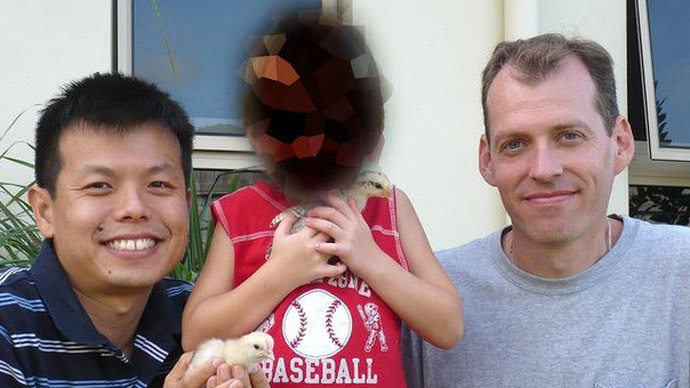An Australian, who together with his domestic partner, bought a newborn boy in Russia and allowed men around the world to abuse him, has been sentenced in a US court to 30 years in jail.
Peter Truong, 36, born in Vietnam, and his partner Mark Newton,
42, born in the US, both Australian citizens, bought a newborn
boy in Russia for US$8,000, according to prosecutors.
The boy’s birth papers were falsified to list Newton as his
biological father. The fraud then allowed the boy to be adopted
and taken to Queensland, Australia, where the pair lived.
Law enforcers assume the pair allowed at least eight men in
different countries, including Australia, the US, Germany and
France, to abuse the boy between the ages of two and six. The men
recorded videos of their own sexual assaults on the baby and
distributed them across a global pedophile web-source, known as
the Boy Lovers Network.
In June, Mark Newton was sentenced
for the maximum term of 40 years by a US judge in Indianapolis.
Truong faced similar sentence. He however struck a plea deal with
prosecutors. The deal could have allowed a minimum of 24 years.
Both men were tried in the US District Court for the Southern
District of Indiana.
While announcing the sentence in Indianapolis on Monday, District
Court Judge Sarah Evans Barker emphasized Truong’s cooperation
with the authorities in helping them find other pedophiles. She
also noted the fact the accused was himself a victim of childhood
abuse.
The pedophile pair was arrested in Los Angeles in 2011. The boy
has now reportedly been adopted by a US family.
The story caused a stir in the Russian media, with the country’s
Ombudsman for Children’s Rights Pavel Astakhov promising to
closely follow the boy’s life in the new family, as according to
Russian law an adopted child remains a Russian citizen until
adulthood.
“Russian orphans have always attracted foreign perverts
because of accessibility. The foreigners were simply coming and
taking children for money,” Astakhov told RT following
Newton’s sentencing in June.
The story of the Australian pedophile pair once again added fuel
to the debate over the issue of adoptions of Russian children by
foreign citizens, which split the society, when the so-called
‘Dima
Yakovlev Law’ was adopted in 2012.

The law banning American citizens from adopting Russian children
was named after a two-year old Russian boy, who died in 2008 from
heatstroke after his adoptive US father left him locked in a car
on a hot day.
The supporters of the law have cited multiple cases of abuse from
the US adoptive parents against Russian children. According to
Pavel Astakhov, 19 Russian children have been killed in American
families since 2001.
The law’s opponents believe it’s a politically-motivated response
to the US Magnitsky Act – the entry ban and asset freeze on
Russian tax, law and court officials who, in view of the authors
of the act, are guilty of violations of Human Rights.
In June 2013, Russia’s State Duma passed an amendment
that bans the adoption of Russian children by same-sex couples
from abroad and in September the coal-mining territory of
Kemerovo voted to completely outlaw adoptions of local children
by foreigners, making it the first region of the Russian
Federation to introduce such a radical measure. Kemerovo MPs
recently suggested that the State Duma follow suit with a
complete ban on foreign adoptions.
Earlier this month, Prime Minister Dmitry Medvedev praised
the laws restricting foreign adoptions, saying they resulted in
increased number of domestic adoptions, which grew by 5,000
compared to 2012.
Medvedev also stressed that most of the children who had their
American adoptions suspended when the Dima Yakovlev Law came into
force had found new families in Russia.
“In all, we had 259 kids who were about to leave for America.
All but 95 of them still have not received accommodation in a new
family,” he reported. “We will definitely bring this
process to its logical conclusion.”

